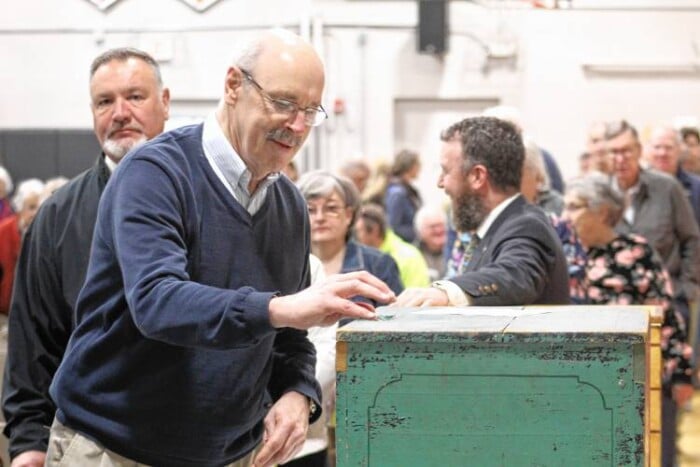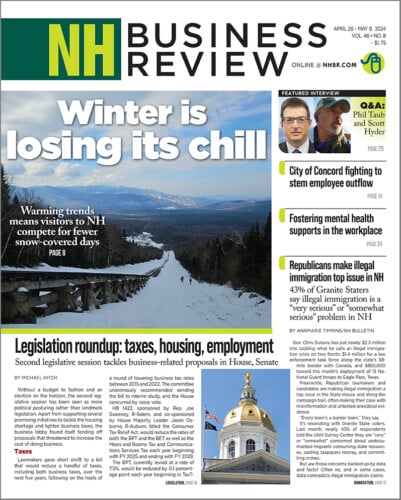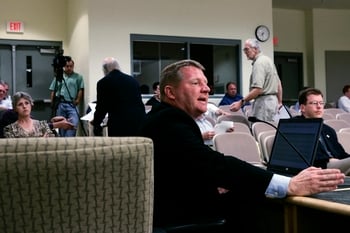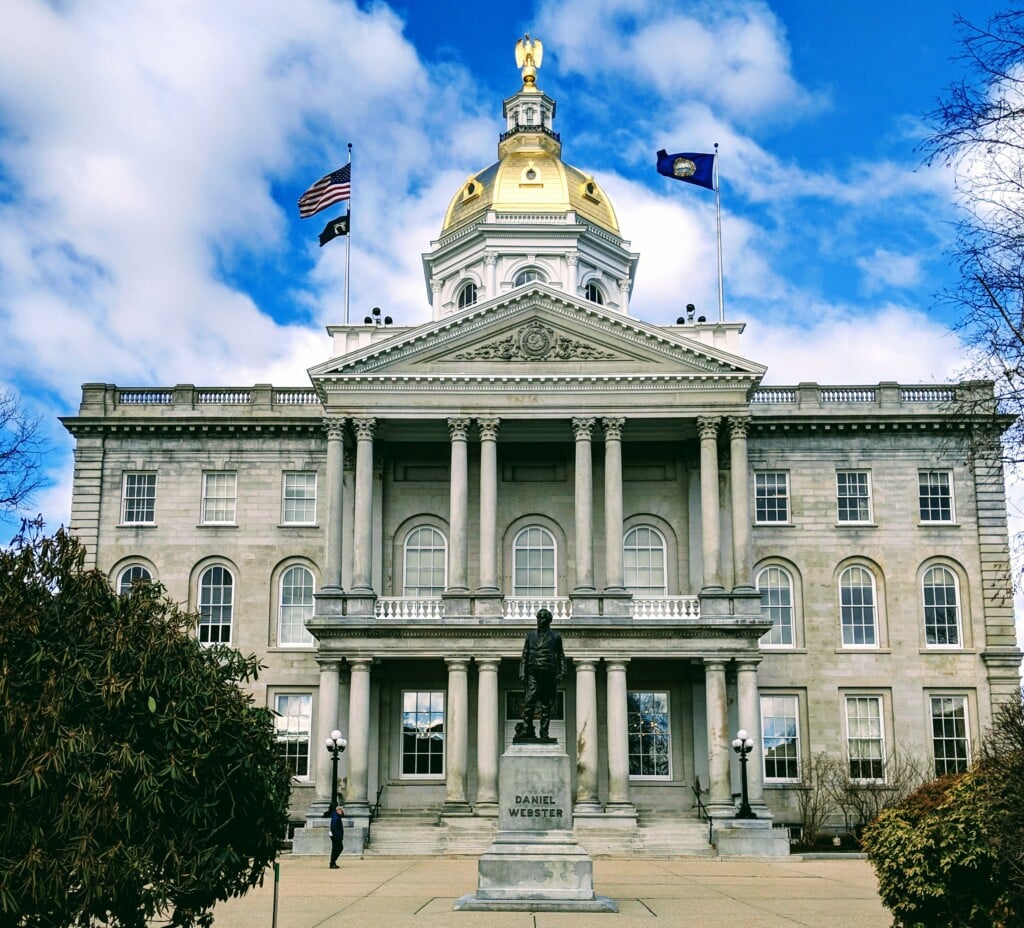Lebanon, Hanover seeking funds to boost EV charging infrastructure
Demand for EV charging stations grows, but funding needs must be met
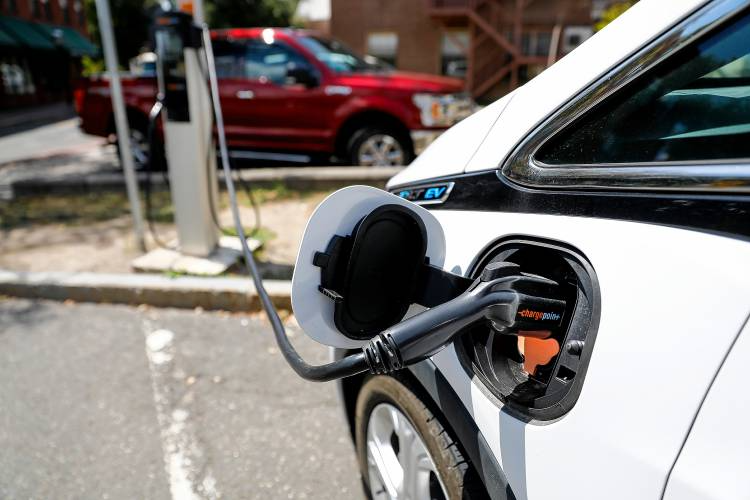
As more electric vehicles hit roads throughout the Upper Valley, municipalities are wising up to the fact that a lack of accessible charging infrastructure could pump the brakes on EV adoption in the Upper Valley.
To build more than 90 public charging stations, Lebanon has applied for $5.2 million in federal funding fueled by the Inflation Reduction Act. If awarded money from the Charging and Fueling Infrastructure Grant Program, the city would be positioned to increase its EV charging capacity significantly.
Currently, there are around 25 public charging stations in Lebanon, according to website and app PlugShare.
Just 200 public charging stations are available across New Hampshire, which is equivalent to half of the public charging capacity in Vermont.
Lebanon expects to hear about the fate of its grant application within the next month, said Tad Montgomery, Lebanon’s energy and facilities manager.
Divided into three tiers based on the amount of electricity they provide, EV chargers work at different speeds. A thoughtfully planned network of chargers runs the gamut, Montgomery said.
Level-one chargers can work through a commonplace 120-volt AC plug. While requiring no additional installation, they’re also the slowest, and can take up to two days to fully charge an electric car.
Level two chargers can juice up a battery overnight, but also require the installation of a 200-volt plug similar to those used to power clothes dryers. The New Hampshire Electric Co-op offers its residential utility customers rebates of up to $300 to install a level-two charging station.
For drivers on long-range road trips, DC Fast Chargers, which can recharge a car to nearly full power in as little as 15 minutes, are the most sensible option. But they’re also the most expensive to operate. (Plug-in hybrid EVs can’t use DC Fast Charging.)
The cost to use a charging station varies with speed.

An electric vehicle charging station in Concord. (Photo by Dana Wormald)
In addition to being charged for the electricity used, most ratepayers also are met with a “demand charge.” The extra fee is based on the maximum amount of power used over the course of a month. “If you turn on 10 hairdryers all at once, your electricity would spike for the five minutes you have them all on,” Montgomery said. “You turn them all off and go the rest of the month, but you’d still have that demand charge.”
EV chargers use “tremendous amounts of power,” he said, and drive up demand charges.
DC Fast Chargers, which use the most energy the quickest, are essentially “cost prohibitive” for many municipalities, Montgomery said. As such, written into the grant is funding that could help Lebanon cover demand charges in its public EV chargers for five years.
“(The Charging and Fueling Infrastructure grant) will be a big deal if we get it, and took a tremendous amount of effort,” Montgomery said, commending especially the work of Sherry Boschert, a volunteer member of the Lebanon Energy Advisory Committee who spearheaded work on the application.
On top of the federal funding, Lebanon is hoping for some money from the state.
New Hampshire is dolling out $10 million through the Granite State Clean Fleets program to replace municipally owned diesel vehicles with electric or hybrid cars and trucks. The funding comes from the “diesel-gate” scandal, Montgomery said.
In 2017, the Department of Justice and Volkswagen signed a multi-billion dollar settlement when it was found that the car manufacturer had violated the Clean Air Act by rigging emissions tests in its vehicles.
Now, New Hampshire holds over $30 million in trust to bankroll emissions mitigation projects in vehicles.
Through the fund, Lebanon is applying to purchase two electric street sweepers. The city currently has two EVs — a Nissan Leaf and an electric truck, the Ford F-150 Lightning Volt — operated by the Public Works Department, and the addition of the street sweepers would be the first part of a broader push to transition Lebanon’s entire municipal fleet to EVs.
Having a charger that could operate even in an electrical grid failure would be crucial to pulling off that transition, particularly for emergency service vehicles, Montgomery said. As pitched by the city in its grant application, a DC Fast Charger would be installed at the landfill, powered by the city’s landfill to gas energy project, which converts methane gas emitted by the landfill into electricity.
Construction on the project is expected to begin in the spring, according to Erica Douglas, Lebanon’s solid waste manager.
A DC Fast Charger at the landfill “would still be working if the grid goes down,” Montgomery said. “As part of our regional thinking on this, I am reaching out to neighboring communities to ask, ‘Hey, as you all transition your fleet to electric, would having access to this independent charging station at our landfill be of use to you? Would it help you with your transition? Especially your emergency vehicles?’ So far, I’ve gotten nothing but favorable answers to that.
“Plus, we’d be charging any vehicle there with renewable energy,” he added.
According to the U.S. Department of Energy, EVs reduce emissions by two-thirds compared with vehicles that run on gasoline. This is even after accounting for emissions created by electricity production. And charging an EV in Vermont — where the energy on the grid comes from more renewable sources, particularly hydroelectric power — burns fewer fossil fuels than it does in New Hampshire.
Making the lithium-ion batteries that power most plug-in cars requires mining for raw materials, including lithium and cobalt. Environmentally destructive extraction processes and human rights concerns endemic to the recovery of the metals have drawn the ire of critics, some of whom say that touting the emissions reduced by EVs can distract from, or even silence, information about other harm done by the vehicles.
“Yes, you have a tradeoff between battery mining and fossil fuel mining,” Montgomery said. “But I will say, batteries are continually getting more efficient and cleaner and not requiring those precious metals.”
In January, Lebanon became the first municipality in New Hampshire to adopt zoning regulations requiring EV charging at new multi-unit housing.
Ben Steele, a member of Sustainable Hanover, keeps tabs on the town’s EV infrastructure. In line with national trends, the number of EVs registered to Hanover owners has almost doubled in two years, from 120 in 2020 to 232 in 2022, Steele said.
But along with a couple of standalone chargers, there are a cluster of chargers in two parking garages in town. Compared to the growing demand, “that’s not a whole lot of charging,” he said.
Over half of EV owners charge their vehicle at home exclusively. Norwich is among the towns with the highest number of EVs per capita in Vermont but only has two public charging stations, according to data from Drive Electric Vermont that was first reported by Vermont Public.
Steele said the infrastructure that Hanover hopes to build out will be aimed at making charging available to people in multi-unit and rental housing. Sustainable Hanover also wants to encourage employers to make charging available, which could in turn encourage their employees to purchase EVs.
Hanover is planning to apply for grant funding to expand its EV charging this year from the same sources Lebanon did, Steele said.
“It’s sort of a chicken-and-egg problem: People are hesitant to get one because there aren’t enough chargers around, and people aren’t installing chargers because there aren’t enough EVs yet,” he said. “So I think the way is to build chargers.”
On Saturday, Oct. 7, the Lebanon Energy Advisory Committee and Sustainable Hanover are scheduled to co-host the Upper Valley Electric Vehicle Exposition from 10 a.m. to 3 p.m.
In the parking lot off Flynn Street behind Lebanon City Hall, at 51 North Park Street, cars, trucks and motorcycles representing 18 models of electric vehicles and plug-in hybrids are set to be on display, according to a news release. Presentations on EVs will be given inside City Hall.
“I would recommend this to anyone considering an EV,” said Montgomery, Lebanon’s energy and facilities manager. “Come and get behind the wheel of one of these things.”
This article is being shared by partners in The Granite State News Collaborative. For more information, visit collaborativenh.org.





